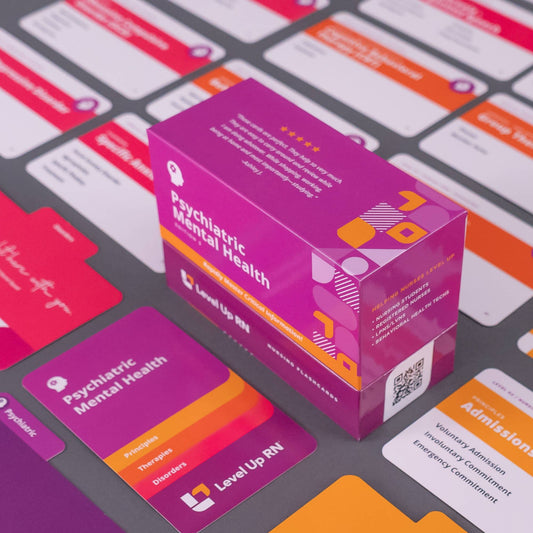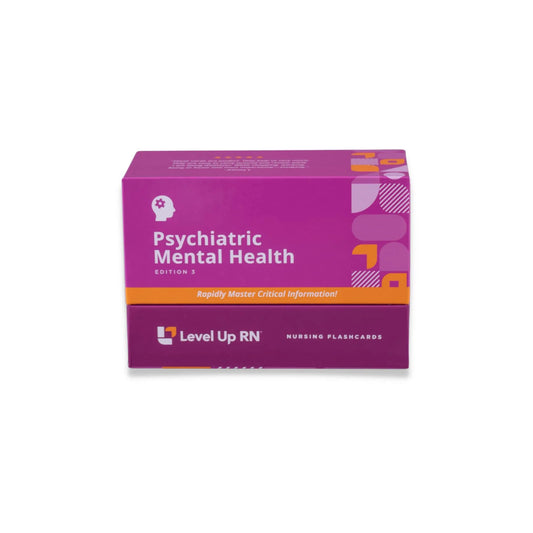Psychiatric Mental Health, part 16: Therapies - Neurotransmitters & Patient Teaching for Psych Meds
Updated: Cathy ParkesFour key neurotransmitters that are commonly affected by mental health medications, including: GABA, serotonin, norepinephrine, and dopamine. Key teaching that should be provided a patient who is prescribed a psychiatric medication. Signs/symptoms of serotonin syndrome and what herbal supplement can increase the risk for serotonin syndrome.
Full Transcript: Psychiatric Mental Health, part 16: Therapies - Neurotransmitters & Patient Teaching for Psych Meds
Full Transcript: Psychiatric Mental Health, part 16: Therapies - Neurotransmitters & Patient Teaching for Psych Meds
Hi, I'm Cathy with Level Up RN. In this video, I will be discussing four key neurotransmitters that are commonly affected by mental health medications. I will also be talking about important teaching that you need to provide your patient who is prescribed psychiatric medication. And at the end of the video, I'm going to give you guys a little quiz to test your knowledge of some of the key points I'll be covering, so definitely stay tuned for that. And if you have our Level Up RN psychiatric mental health nursing flashcards, pull them out. I am about a third of the way through our therapy section. We just wrapped up coverage of our non-pharmacological therapies, and now we will be discussing pharmacological therapies. As a review, a neurotransmitter is a chemical messenger that allows neurons to communicate with one another. So a neurotransmitter is released by one neuron into the synapse where it binds to the receptors of another neuron. After binding, some of these neurotransmitters can be taken back up into the first neuron and used again. This is referred to as reuptake. So an important thing to note is that the mode of action of many psychiatric medications is to block this reuptake. And this, in turn, increases the amount of a neurotransmitter in the synapse.
Four key neurotransmitters that are commonly affected by psychiatric medications include GABA, serotonin, norepinephrine, and dopamine. GABA is an inhibitory neurotransmitter that decreases nerve excitability and has a calming effect. So medications such as benzodiazepines and certain mood stabilizers work by increasing levels of GABA. Our cool chicken hint to help you remember this neurotransmitter is Gabby gabs non-stop, and it makes her friends very sleepy just like the effects of the neurotransmitter GABA. Serotonin is a neurotransmitter that regulates mood, attention, and sleep. And several of the drug classes that we will be talking about in this video playlist work by blocking reuptake of serotonin, which increases the amount of circulating serotonin in the brain. Very common drug classes that have this mode of action include SSRIs as well as SSNRIs. Norepinephrine is a neurotransmitter that affects stress, sleep, attention, and focus, as well as autonomic nervous system function. Several different antidepressants work by increasing levels of norepinephrine, including tricyclic antidepressants and SSNRIs. And finally, dopamine is an important neurotransmitter that regulates movement, attention, motivation, and reward. And alterations in dopamine have been linked to disorders such as schizophrenia and ADHD. And several of the medication classes that we will be talking about in this video playlist altered levels of dopamine, including antipsychotic agents, as well as buspirone.
Let's move on now to important teaching that you'll want to provide your patient who is prescribed a psychiatric medication. So each medication, of course, has specific side effects and specific considerations that you'll definitely want to cover with your patient. However, there is general teaching that is also important to convey to your patient who is prescribed a mental health medication. First of all, medications should be taken exactly as prescribed. The patient should not discontinue or change the dose without talking with the provider first. And if they miss a dose, they shouldn't just double up on their next dose unless specifically instructed to do so by their provider. The patient should notify their provider of any herbal supplements, over-the-counter medications, or prescription medications they are taking because several of the mental health medications we'll be talking about interact with other medications and supplements. And some of these interactions can be life-threatening. The patient should also be made aware that it can take several weeks to feel the full effects of a medication. So they should not expect immediate results for most of the mental health medications that we'll be talking about.
Because many psychiatric medications increase the risk for serotonin syndrome, it's important to teach your patient to notify the provider for any signs and symptoms of serotonin syndrome, which include agitation, diaphoresis, fever, nausea and vomiting, tachycardia, muscle rigidity, and tremors. It's also important to tell your patient that they should not take St. John's Wort, which is a common herbal supplement, alongside their psychiatric medication because this can further increase the risk for serotonin syndrome. All right, it's quiz time. Are you guys ready? I have three questions for you. First question. Blank is a neurotransmitter that decreases nerve excitability and has a calming effect. The answer is GABA. Question number two. Excess levels of what neurotransmitter can cause symptoms such as agitation, fever, diaphoresis, tremors, and tachycardia? The answer is serotonin. So those are the symptoms of serotonin syndrome. Question number three. When taken with a psychiatric medication, blank is a key herbal supplement that increases a patient's risk for serotonin syndrome. The answer is St. John's Wort. Okay. I hope you did great with that quiz, and I hope you enjoyed this video. Take care and good luck with studying.


